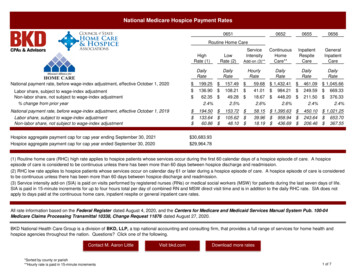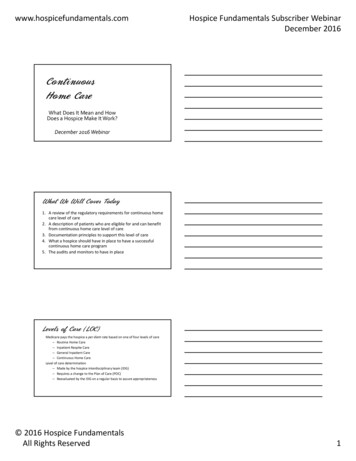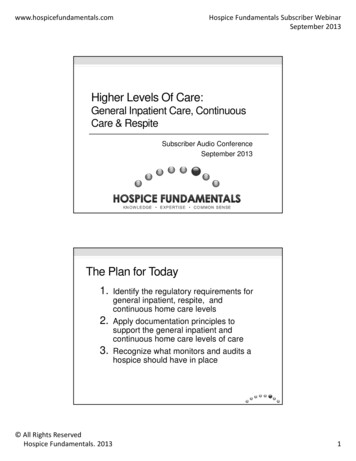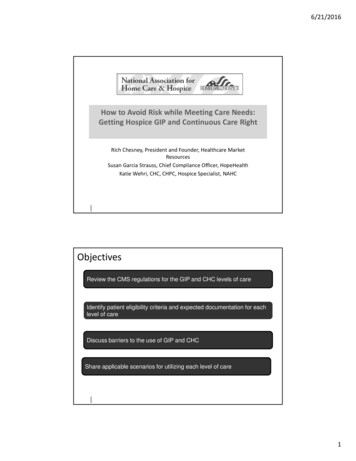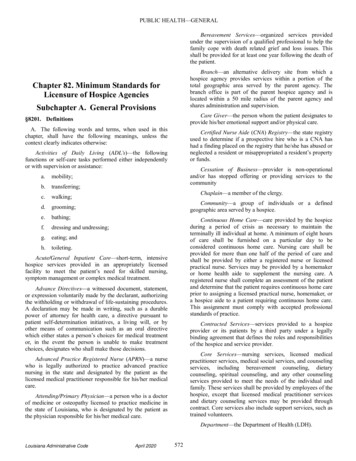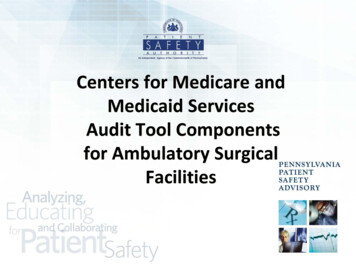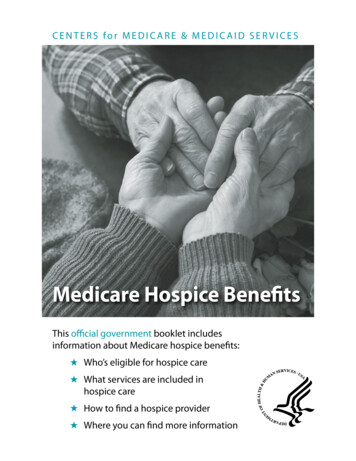
Transcription
CENTERS for MEDICARE & MEDICAID SERVICESMedicare Hospice BenefitsThis official government booklet includesinformation about Medicare hospice benefits:Who’s eligible for hospice careWhat services are included inhospice careHow to find a hospice providerWhere you can find more information
WelcomeChoosing to start hospice care is a difficult decision. Theinformation in this booklet and support from a doctor andtrained hospice care team can help you choose the mostappropriate health care options for someone who’s terminally ill.The information in this booklet describes the MedicareProgram at the time this booklet was printed. Changesmay occur after printing. Visit Medicare.gov, or call1-800-MEDICARE (1-800-633-4227) to get the most currentinformation. TTY users can call 1‑877-486-2048.Paid for by the Department of Health & Human Services.
3Table of contentsHospice care 4Care for a condition other than your terminal illness 5How your hospice benefit works 6Who’s eligible for the hospice benefit 7Finding a hospice provider 7What Medicare covers 8Respite care 9What your hospice benefit won’t cover 9Hospice care if you’re in a Medicare Advantage Plan or other Medicarehealth plan 10Information about Medicare Supplement Insurance (Medigap) policies 10What you pay for hospice care 11How long you can get hospice care 12Stopping hospice care 12Your Medicare rights 13How to submit a quality of care complaint 13For more information 14Definitions 15
4Hospice careHospice is a program of care and support for people who areterminally ill (with a life expectancy of 6 months or less, if the illnessruns its normal course) and their families. Here are some importantfacts about hospice: Hospice helps people who are terminally ill live comfortably. Hospice isn’t only for people with cancer. The focus is on comfort (palliative care), not curing an illness. A specially trained team of professionals and caregivers providecare for the “whole person,” including physical, emotional,social, and spiritual needs. Services typically include physical care, counseling, drugs,equipment, and supplies for the terminal illness and relatedconditions. Care is generally given in the home. Family caregivers can get support.Palliative carePalliative care is the part of hospice care that focuses on helpingpeople who are terminally ill and their families maintain theirquality of life. If you’re terminally ill, palliative care can address yourphysical, intellectual, emotional, social, and spiritual needs. Palliativecare supports your independence, access to information, and abilityto make choices about your health care.
5Care for a condition other than your terminal illnessYour hospice benefit covers care for your terminal illness andrelated conditions. Once you start getting hospice care, yourhospice benefit should cover everything you need related to yourterminal illness, even if you remain in a Medicare Advantage Planor other Medicare health plan.After your hospice benefit starts, you can still get covered servicesfor conditions not related to your terminal illness. OriginalMedicare will pay for covered services for any health problems thataren’t part of your terminal illness and related conditions. However,you must pay the deductible and coinsurance amounts for allMedicare-covered services you get to treat health problems thataren’t part of your terminal illness and related conditions.Important: If you were in a Medicare Advantage Plan beforestarting hospice care, and decide to stay in that plan, you canget covered services for any health problems that aren’t part ofyour terminal illness and related conditions. You can choose toget these from either your plan or Original Medicare. For moreinformation on hospice care if you’re in a Medicare AdvantagePlan or other Medicare health plan, see page 10.Note: If you start hospice care on or after October 1, 2020, youcan ask your hospice provider for a list of items, services, anddrugs that they’ve determined aren’t related to your terminalillness and related conditions. This list must include why theymade that determination. Your hospice provider is also requiredto give this list to your non-hospice providers or Medicare ifrequested.Words in blueare defined onpages 15–16.
6How your hospice benefit worksIf you qualify for hospice care, you and your family will workwith your hospice provider to set up a plan of care that meets yourneeds. For more specific information on a hospice plan of care, callyour state hospice organization. Visit Medicare.gov/contacts, orcall 1-800-MEDICARE (1-800-633-4227) to find the number foryour state hospice organization. TTY users can call 1-877-486-2048.You and your family members are part of a team that may alsoinclude: Doctors Nurses or nurse practitioners Counselors Social workers Pharmacists Physical and occupational therapists Speech-language pathologists Hospice aides Homemakers VolunteersIn addition, a hospice nurse and doctor are on-call 24 hours a day,7 days a week, to give you and your family support and care whenyou need it.A hospice doctor is part of your medical team. You can choose toinclude your regular doctor, a nurse practitioner, or a physician’sassistant on your medical team as the attending medical professional.The hospice benefit allows you and your family to stay together in thecomfort of your home, unless you need care in an inpatient facility.If your hospice provider decides you need inpatient hospice care,your hospice provider will make the arrangements for your stay.Words in blueare defined onpages 15–16.
7Who’s eligible for the hospice benefitIf you have Medicare Part A (Hospital Insurance) AND meet all ofthese conditions, you can get hospice care: Your hospice doctor and your regular doctor (if you haveone) certify that you’re terminally ill (you’re expected to live6 months or less). You accept comfort care (palliative care) instead of care tocure your illness. You sign a statement choosing hospice care instead of otherMedicare-covered treatments for your terminal illness andrelated conditions.Note: Only your hospice doctor and your regular doctor (if youhave one) can certify that you’re terminally ill and have 6 monthsor less to live.Finding a hospice providerTo find a hospice provider, talk to your doctor, or call yourstate hospice organization. Visit Medicare.gov/contacts, or call1-800-MEDICARE (1-800-633-4227) to find the number for yourstate hospice organization.You can also visit Medicare.gov/care-compare to find hospiceproviders in your area.Medicare only covers your hospice care if the hospice provideris Medicare approved. Visit Medicare.gov/care-compare to findMedicare-approved hospice providers in your area.If you belong to a Medicare Advantage Plan and want to starthospice care, ask your plan to help you find a hospice provider inyour area. Your plan must help you locate a Medicare-approvedhospice provider in your area.
8What Medicare coversYou can get a one-time only hospice consultation with a hospice medicaldirector or hospice doctor to discuss your care options and managementof your pain and symptoms. You can get this one-time consultation evenif you decide not to get hospice care.Once your hospice benefit starts, Original Medicare will cover everythingyou need related to your terminal illness, but the care you get must befrom a Medicare-approved hospice provider.Hospice care is usually given in your home, but it also may be covered in ahospice inpatient facility. Depending on your terminal illness and relatedconditions, the plan of care your hospice team creates can include any orall of these services: Doctor services Nursing care Medical equipment (like wheelchairs or walkers) Medical supplies (like bandages and catheters) Prescription drugs Hospice aide and homemaker services Physical and occupational therapy Speech-language pathology services Social worker services Dietary counseling Grief and loss counseling for you and your family Short-term inpatient care (for pain and symptom management) Short-term respite care Any other Medicare-covered services needed to manage yourterminal illness and related conditions, as recommended by yourhospice teamNote: If you pay out-of-pocket for an item or service your doctorordered, but your hospice provider refuses to give it to you, you canfile an appeal with Medicare. Contact your State Health InsuranceAssistance Program (SHIP) if you need help filing or understandingan appeal. For more information on filing a claim or an appeal, visitMedicare.gov/claims-appeals or call 1-800-MEDICARE.
9Respite careIf your usual caregiver (like a family member) needs rest, you can getinpatient respite care in a Medicare-approved facility (like a hospice inpatientfacility, hospital, or nursing home). Your hospice provider will arrange thisfor you. You can stay up to 5 days each time you get respite care. You can getrespite care more than once, but only on an occasional basis.What your hospice benefit won’t coverWhen you start hospice care, you’ve decided that you no longer want careto cure your terminal illness and related conditions, and/or your doctorhas determined that efforts to cure your illness aren’t working. Medicarewon’t cover any of these once your hospice benefit starts: Treatment intended to cure your terminal illness and/or relatedconditions. Talk with your doctor if you’re thinking about gettingtreatment to cure your illness. You always have the right to stophospice care at any time. Prescription drugs that aren’t for your terminal illness or relatedconditions. Care from any provider that wasn’t set up by the hospice medicalteam. You must get hospice care from the hospice provider youchose. The hospice team must give or arrange all care that youget for your terminal illness and related conditions. You can’t getthe same type of hospice care from a different hospice, unless youchange your hospice provider. However, you can still see yourregular doctor, nurse practitioner, or physician’s assistant, if you’vechosen him or her to be the attending medical professional. Room and board. Medicare doesn’t cover room and board.However, if the hospice team determines that you need short-terminpatient or respite care services that they arrange, Medicarewill cover your stay in the facility. You may have to pay a smallcopayment for the respite stay.Words in blueare defined onpages 15–16. Care you get as a hospital outpatient (like in an emergencyroom), care you get as a hospital inpatient, or ambulancetransportation, unless your hospice team arranges it or it’sunrelated to your terminal illness and related conditions.Note: Contact your hospice team before you get any of these services, oryou might have to pay the entire cost.
10Hospice care if you’re in a Medicare Advantage Plan orother Medicare health planOnce you start getting hospice care, Original Medicare willcover everything you need related to your terminal illness,even if you choose to remain in a Medicare Advantage Planor other Medicare health plan.If you were in a Medicare Advantage Plan before startinghospice care, you can stay in that plan as long as you payyour plan’s premiums. You can choose to get coveredservices for any health problems not related to your terminalillness from either your plan or Original Medicare.What you pay will depend on the plan and whether youfollow the plan’s rules, like seeing in-network providers.If your plan covers extra services that Original Medicaredoesn’t cover (like dental and vision benefits), your plan willcontinue to cover these extra services as long as you continueto pay your plan’s premiums and other costs.For more information about Original Medicare, MedicareAdvantage Plans, and other Medicare health plans, visitMedicare.gov or call 1-800-MEDICARE (1-800-633-4227).TTY users can call 1-877-486-2048.Information about Medicare Supplement Insurance(Medigap) policiesIf you have a Medigap policy, it will cover your hospice costsfor drugs and respite care. Your Medigap policy will also helpcover health care costs for problems that aren’t part of yourterminal illness and related conditions. Call your Medigappolicy or your State Health Insurance Assistance Program(SHIP) for more information.To get more information about Medigap policies, visitMedicare.gov or call 1-800-MEDICARE.Words in blueare defined onpages 15–16.
11What you pay for hospice careMedicare pays the hospice provider for your hospice care.There’s no deductible. You’ll pay: Your monthly Medicare Part A (Hospital Insurance)and Medicare Part B (Medical Insurance) premiums. A copayment of up to 5 per prescription foroutpatient prescription drugs for pain and symptommanagement. In the rare case the hospice benefitdoesn’t cover your drug, your hospice provider shouldcontact your Medicare drug plan (if you have one) to seeif your plan covers it. 5% of the Medicare-approved amount for inpatientrespite care.For example, if Medicare approves 100 per day for inpatientrespite care, you’ll pay 5 per day and Medicare will pay 95 perday. The amount you pay for respite care can change each year.Important: Once your hospice benefit starts, Original Medicarewill cover everything you need related to your terminal illness.Original Medicare will also pay for covered services for anyhealth problems that aren’t part of your terminal illness andrelated conditions. See page 5 for more information.Note: If you need to get inpatient care at a hospital for yourterminal illness and/or related conditions, your hospiceprovider must make the arrangements. The cost of yourinpatient hospital care is covered by your hospice benefit andpaid to your hospice provider. Since the hospice providerand the hospital have a contract, they work out the paymentbetween them. However, if you go to the hospital and yourhospice provider did not make the arrangements, you might beresponsible for the entire cost of your hospital care.
12How long you can get hospice careHospice care is for people with a life expectancy of 6 months or less (ifthe illness runs its normal course). If you live longer than 6 months,you can still get hospice care as long as the hospice medical director orother hospice doctor recertifies that you’re terminally ill.Hospice care is given in benefit periods. You can get hospice care fortwo 90-day benefit periods followed by an unlimited number of 60-daybenefit periods. A benefit period starts the day you begin to get hospicecare, and it ends when your 90-day or 60-day benefit period ends. Atthe start of the first 90-day benefit period, your hospice doctor and yourregular doctor (if you have one) must certify that you’re terminally ill(with a life expectancy of 6 months or less).Important: At the start of each benefit period after the first 90-daybenefit period, the hospice medical director or other hospice doctormust recertify that you’re terminally ill, so you can continue to gethospice care. Once your hospice benefit starts, you don’t need to“re-choose” hospice care for each new benefit period.Note: You have the right to change your hospice provider once duringeach benefit period.Stopping hospice careIf your health improves or your illness goes into remission, you may nolonger need hospice care. You always have the right to stop hospice careat any time. If you choose to stop hospice care, the hospice provider willask you to sign a form that includes the date your care will end.No one should ask you to sign any forms about stopping your hospicecare at the time you start hospice. Stopping hospice care is a choice onlyyou can make, and you shouldn’t sign or date any forms until the actualdate that you want your hospice care to stop.Words in blueare defined onpages 15–16.
13Stopping hospice care (continued)If you were in a Medicare Advantage Plan when you started hospice,you can stay in that plan while getting hospice care, by continuing topay your plan’s premiums. If you stop your hospice care, you’re still amember of your plan and can continue to get Medicare coverage fromyour plan after you stop hospice care. See page 10 for more information.If you weren’t in a Medicare Advantage Plan when you started hospicecare, and you decide to stop hospice care, you can continue in OriginalMedicare. If you’re eligible, you can go back to hospice care at any time.Your Medicare rightsAs a person with Medicare, you have certain guaranteed rights,including: The right to get care that meets professionally recognizedstandards. If you believe that the care you’re getting is belowthis standard, and you’re dissatisfied with the way your hospiceprovider has responded to your concern, you have the rightto contact a Beneficiary and Family Centered Care QualityImprovement Organization (BFCC-QIO). Visit Medicare.gov/contacts, or call 1-800-MEDICARE (1-800-633-4227) to getthe phone number for your BFCC-QIO. TTY users can call1-877-486-2048. The right to ask for a review of your case. If your hospiceprovider or doctor believes that you’re no longer eligible forhospice care because your condition has improved, and youdon’t agree, you have the right to ask for a review of your case.Your hospice provider should give you a notice that explainsyour right to an expedited (fast) review by a BFCC-QIO.If you don’t get this notice, ask for it. This notice lists yourBFCC-QIO’s contact information and explains your rights.To see a full list of your rights, visit Medicare.gov/claims-appeals/yourmedicare-rights, or call 1-800-MEDICARE.
14How to submit a quality of care complaintIf you or your caregiver has a complaint about the quality of care you getfrom your hospice provider, you can file a complaint with your hospiceprovider directly. If you are uncomfortable filing a complaint withyour hospice provider, or if you’re dissatisfied with how your hospiceprovider has responded to your complaint, you can file a complaintwith your BFCC-QIO by visiting r calling 1-800-MEDICARE (1‑800‑633‑4227). TTY users can call1-877-486-2048.For more informationTo learn more about Medicare eligibility, coverage, and costs and getofficial Medicare publications and resources, visit Medicare.gov or call1-800-MEDICARE.To get help finding a hospice provider: Visit Medicare.gov/care-compare. Talk to your doctor. Call your state hospice organization.Visit Medicare.gov/contacts, or call 1-800-MEDICARE to findthe number for your state hospice organization.For free health insurance counseling and personalized help withinsurance questions, call your State Health Insurance AssistanceProgram (SHIP). To find the contact information for
If you belong to a Medicare Advantage Plan and want to start hospice care, ask your plan to help you find a hospice provider in your area. Your plan must help you locate a Medicare-approved hospice prov
